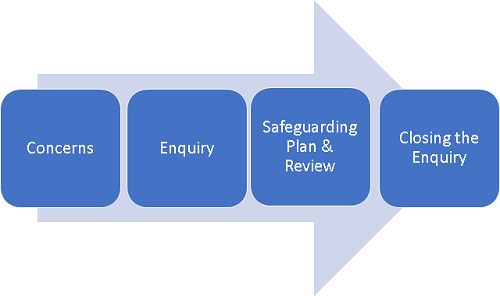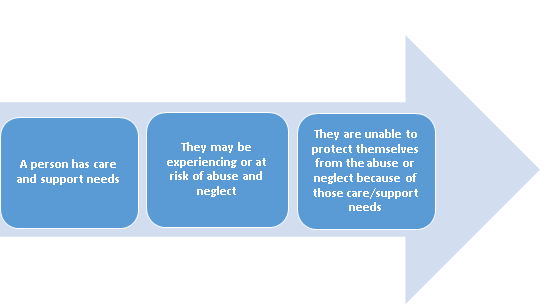The Four Stage Approach - Stage One: Raising Concerns
These chapters have been structured with a Four Stage Approach:

Stage 1 - Raising a Concern
A safeguarding concern can be made by anyone and is the way of reporting abuse or neglect which is identified or received within any agency.
Safeguarding concerns may be received from a wide range of sources (for example: members of the public, family members, staff, statutory agencies, service providers, community and voluntary sector, Health, States of Jersey Police, or people receiving care and support services). Each agency (including third sector organisations) should have its own clearly defined safeguarding policy which describes the internal process for raising a safeguarding concern and how to refer to the lead agency – the Safeguarding Adults Team (Health & Community Services).
1. What to do if you Recieve a Disclosure or Observe or Witness Abuse
In emergency situations please call 999 for the most appropriate service to respond. For (not urgent) criminal matters to be reported - please call SOJ Police on 01534 612612.
If, on the basis of the information available, it appears that the following three steps are met, a concern should be raised to the Safeguarding Adults Team:

CLICK HERE TO SEE THE RAISING A CONCERN FORM
(includes a body map)
Concerns raised to the SAT should include the following information (where available):
| Demographic and contact details for the adult at risk, the person who raised the concern and for any other relevant individual, specifically carers and next of kin. | Basic facts, focusing on whether or not the person has care and support needs including communication and on-going health needs; |
| Factual details of what the concern is about; what, when, who, where; | Immediate risks and action taken to address risk; |
| If reported as a crime - details of when this was made, the officer's name OR crime reference number etc; | Whether the adult at risk has any cognitive or other impairment which may impede their ability to protect themselves; |
| Any information on the source of harm, or person alleged to have caused harm; | Wishes and views of the adult at risk, in particular consent and preferred method of communication; |
| Advocacy involvement (includes family/friends); | Any recent history (if known) about previous concerns of a similar nature or concerns raised about the same person, or someone within the same household. |
2. Good Practice Guide
If an adult discloses abuse to you directly, use the Listen, Respect, Reassure principles to respond:
| Listen To Me |
|
| Respect Me |
|
| Reassure Me |
|
3. Concerns - Deciding How to Progress
In deciding how to help or advise, the first consideration for the Safeguarding Adults Team (SAT), is whether these multiagency policy and procedures are the best fit for the person in this particular situation. These policy and procedures may not always be the right or best way of providing someone with personalised support.
The SAT will research information held by Health and Community Service (HCS) in relation to the people named in the concern, and the SAT will share and receive information with/from other relevant partners in order to satisfy themselves that sufficient initial background checks have been established.
Click here to see the SPB Information Sharing Protocol.
The SAT may decide for example, that the concerns are not of a nature or degree that requires further progression under safeguarding arrangements. This is not to suggest that the issues raised are not important or of significance, but rather that they should be managed in a different or more proportionate way. In such circumstances, the SAT may request of someone else to advise of alternative sources of support or ways of managing the concern (for example, by signposting to a social worker for a reassessment of needs or to a specialist advisory service such as the Independent Domestic Violence Advisor (IDVA).
Equally, the SAT may choose to undertake further background checks (or request others to do so) in order to establish more information about a person, or situation. This provides an opportunity to gather additional information and defer a decision on what if any next steps may be required. It is important that timescales are attached to these activities to prevent unnecessary drift.
Throughout this (and every) stage, it is important that the views and wishes of the person at risk are included within any decision-making. Such views may have been gathered at the point that concerns were raised, but there may be a need for further conversations to take place in order to decide how to respond to the concerns. People's views and outcomes will be subject to change.
From the information shared - the SAT (with others) may (then) decide that further activities to meet the person's outcomes may be best managed outside of safeguarding: this could be through ongoing case work, a timely reassessment of needs, or changes to care and support provision (as an example).
Where a crime is suspected and referred to the Police, then the Police will lead the criminal investigations with the support of the SAT and/or other agencies where appropriate (for example, by providing information and assistance, or additional care and support). The SAT and others have an ongoing responsibility to promote the wellbeing of the adult in these circumstances. A criminal investigation by the police takes primacy over all other types of enquiry.
In cases where the person's desired outcomes may be met through a variety of ways, and risks can be addressed through alternative measures rather than adult safeguarding arrangements, proper advice will be given to people about the options available to them. All decisions MUST be defensible and MUST be properly recorded and communicated. If an enquiry is indicated as necessary, the SAT will commence a planning process.


